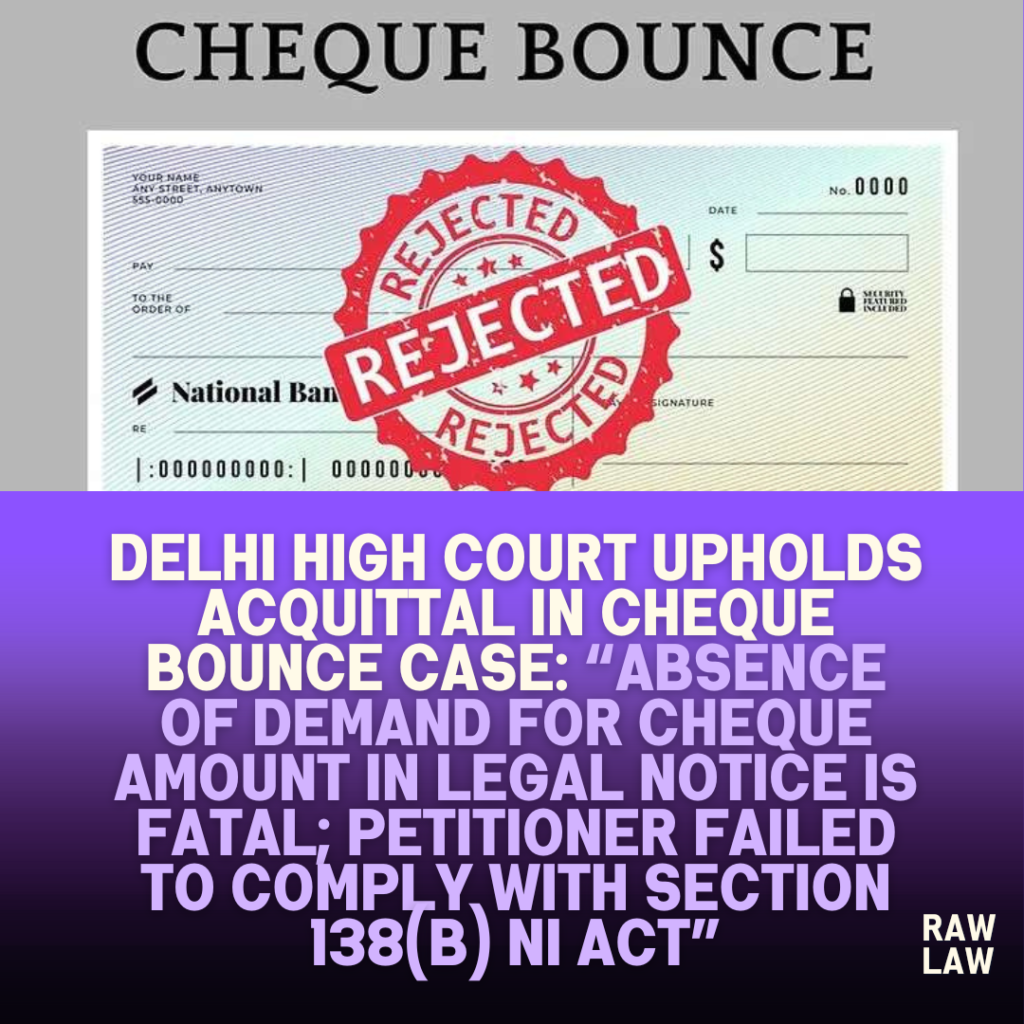Court’s Decision
The Delhi High Court dismissed the criminal leave to appeal filed under Section 378 CrPC challenging the acquittal of the accused in a complaint under Section 138 of the Negotiable Instruments Act, 1881. Justice Amit Mahajan upheld the Metropolitan Magistrate’s judgment on the ground that the complainant failed to serve a valid legal notice demanding the cheque amount and further failed to establish a legally enforceable debt after the respondents successfully raised a probable defence.
“The petitioner failed to comply with the requirement under Section 138(b) of the NI Act. The legal notice did not qualify as a demand for money as stipulated.”
“Even if the petitioner’s case is taken at the highest… since the respondents had already raised a probable defence… the onus was on the petitioner to show that there existed a debt/liability in the manner as pleaded.”
Facts
The petitioner, a proprietor of a consultancy business, claimed dues of ₹2,64,689 for services rendered in customs clearance and freight forwarding. Two cheques of ₹50,000 each were issued by the respondent company through its managing director, allegedly towards part payment. Upon dishonour with the remark “payment stopped”, and subsequent failure to pay within the statutory period despite a legal demand notice, the complainant initiated proceedings under Section 138 NI Act. The Metropolitan Magistrate acquitted the respondents, holding the legal notice to be defective and accepting the defence raised.
Issues
- Whether the legal demand notice complied with the mandatory requirement under Section 138(b) of the NI Act?
- Whether the accused successfully rebutted the presumption under Section 139 NI Act?
- Whether the acquittal of the accused by the trial court was perverse or legally unsustainable?
Petitioner’s Arguments
The petitioner argued that the Metropolitan Magistrate erred in law by not appreciating that once the issuance of the cheques was admitted, a presumption under Section 139 of the NI Act operated in his favour. He claimed that the respondents failed to rebut this presumption and that the learned Magistrate ignored the evidence on record.
Respondent’s Arguments
The respondents contended that the complaint was not maintainable due to the absence of a valid legal notice demanding the cheque amount as required under Section 138(b). They further argued that they raised a probable defence by highlighting billing discrepancies, issuance of double bills, and inconsistent statements of account maintained by the complainant. The outstanding amount shown in the legal notice (₹2,64,689) differed from the document (₹2,43,982) produced during the trial, without any explanation.
Analysis of the Law
The Court reiterated that service of a valid legal notice is a condition precedent for a valid complaint under Section 138. The words “said amount of money” refer specifically to the cheque amount. Relying on Rahul Builders v. Arihant Fertilizers & Chemicals [(2008) 2 SCC 321], it held that vague or omnibus notices that do not specify the cheque amount are insufficient.
On the issue of statutory presumptions under Sections 118 and 139 NI Act, the Court cited Rangappa v. Sri Mohan [(2010) 11 SCC 441] and Rajesh Jain v. Ajay Singh [(2023) 10 SCC 148] to explain that once a probable defence is raised by the accused, the burden shifts back to the complainant to prove the debt/liability as a matter of fact.
Precedent Analysis
- Rohitbhai Jivanlal Patel v. State of Gujarat, (2019) 18 SCC 106: Held that appellate interference in acquittals under NI Act is permissible where there is perversity, but presumption under Section 139 makes a difference in NI Act cases.
- Rajesh Jain v. Ajay Singh, (2023) 10 SCC 148: Clarified the shifting burden of proof and emphasized that once the presumption is rebutted by the accused, the complainant must prove the debt independently.
- Rahul Builders v. Arihant Fertilizers, (2008) 2 SCC 321: Reaffirmed that the demand notice must specify the cheque amount.
- Suman Sethi v. Ajay Churiwal, (2000) 2 SCC 380: Held that notices demanding unspecified or ambiguous amounts are insufficient under Section 138.
Court’s Reasoning
The Court found that:
- The legal notice demanded the full dues rather than the cheque amount of ₹1,00,000.
- The demand “to clear all the dues” did not meet the requirement under Section 138(b).
- The accused had rebutted the presumption by showing discrepancies in billing, such as incorrect/double invoicing and inconsistent outstanding amounts.
- The complainant failed to explain these contradictions or prove the debt as a matter of fact after the presumption was rebutted.
Thus, there was no perversity in the acquittal judgment warranting interference.
Conclusion
The High Court held that since the petitioner failed to comply with Section 138(b) and the respondents raised a valid probable defence, the Metropolitan Magistrate rightly acquitted the accused. No perversity in the lower court’s reasoning was found.
“The decision of acquittal fortifies the presumption of innocence… this Court finds no such perversity in the impugned judgment so as to merit an interference.”
Implications
The judgment reinforces that:
- Strict compliance with Section 138(b) NI Act is necessary.
- Presumption under Section 139 is rebuttable on a preponderance of probabilities.
- Acquittals in cheque dishonour cases will not be lightly interfered with unless findings are perverse.
- Accurate, consistent financial records and specific demands are critical in cheque dishonour cases.
Also Read: Calcutta High Court Quashes Defamation and False Case Proceedings Against Police Officer
